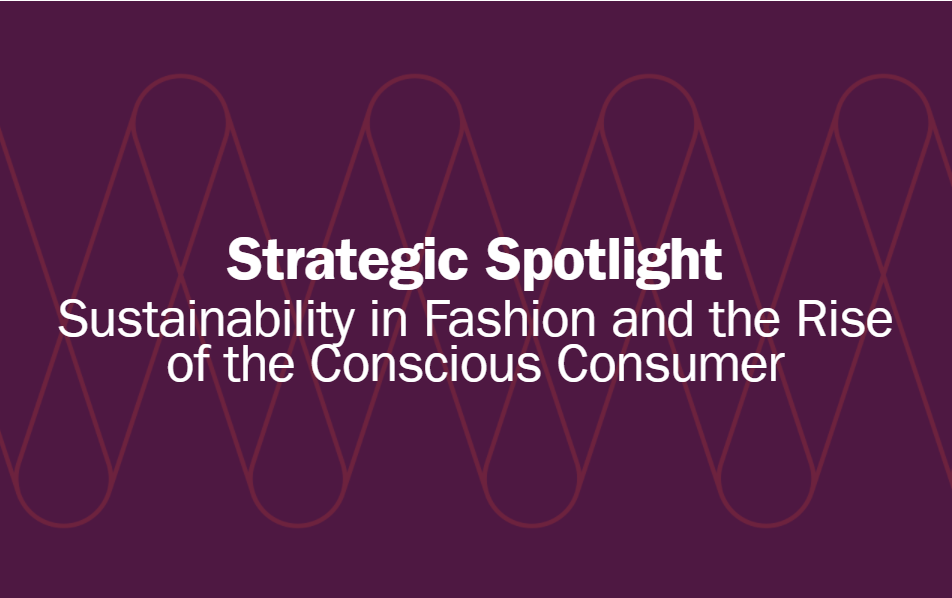
Strategic Spotlight: Sustainability in Fashion and the Rise of the Conscious Consumer

It’s Christmas party season and my
in-box is full of ‘must-have’ looks for all occasions, but this year I will be
revisiting the pressure to buy a new outfit for every event. I’m dialling it
down because, like many consumers – and brands – I’m thinking more ethically
about fashion and sustainability, so I’ll be planning my wardrobe accordingly,
wearing pieces more than once and mixing old with new.
We know it’s a challenge for
fashion to become more sustainable, especially fast fashion where cost, volume,
and speed of manufacture take priority, but if our current levels of
consumption continue, fashion will account for more than a quarter of our total
impact on climate change by 2050.
Technology is a big enabler of the
instant gratification of fast fashion but it’s also a key driver of change
towards more ethical practices.
Social media can turn a backlash
against unethical behaviour into a national news story within minutes - look at
the outrage generated when Burberry was caught destroying unsold goods to 'protect its brand'. The company was compelled into an overnight change of
policy.
Digital exposes brands behaving
badly, but it also gives them a space to spell out sustainability practices,
provide visibility about where their products are sourced, and connect with
customers who care about the issues, so they can call out good behaviour as
well as bad.
Likewise, e-commerce is not just a
quick way to lay your hands on the latest fashions, it’s also the place where
people go to buy and sell pre-owned items on sites like Depop and eBay. There
has even been a rise in the popularity of second hand luxury fashion, with
players such as Vestiaire Collective and HEWI cornering the market. The stigma
of 'second hand' has become the cachet of 'vintage'.
Social media has played its part
in the acceleration of fast fashion by relentlessly encouraging the pursuit of
the new, but it is also at the forefront of a more sustainable movement and a
changing consumer mindset.
More thoughtful influencers like
The Frugality started out a few years ago with an ethical message, mixing old
with new. Others are starting to follow suit, spurred on by Guardian fashion
editor Jess Cartner-Morley, who wrote recently about her eco-makeover in
pursuit of a better planet.
Many brands are making their own
moves towards more sustainable goals, with Uniqlo leading the way, perhaps
because the issue is taken more seriously in Asia, where the sweatshops and the
environmental impacts of waste are so much closer to home.
ASOS, H&M and Zara all have
eco-conscious collections alongside their main lines, and ASOS has introduced
electric delivery vans in central London, while John Lewis and Waitrose have
promised to use bio-methane in all delivery trucks by 2028. Given the scale of
the problem, these might feel like token gestures, but they demonstrate the
direction of travel.
While H&M is still very much a
fast fashion retailer, its parent group is investing in new concepts like
Arket, a chain of stores that launched under a sustainability banner last year.
Again these are only beginnings, but they show that H&M Group is serious
about expanding its business model beyond fast fashion.
For upmarket propositions, where
cost is less of an issue, there is an opportunity to lead the way. Stella
McCartney was one of the first designers to think about ethics and fashion, and
has set a long-term example of how to build a fashion business on ethical practices,
leading the way for other environmentally conscious brands such as Reformation
who have gained a cult like following.
Despite Stella’s influence, the UK is Europe’s worst offender for throwaway fashion. We currently buy almost twice as many clothes as consumers in Italy, Germany and the Netherlands, but we can all do our bit to be more ethical in our fashion choices. Starting with that Christmas wardrobe.
Natalie Howard is Ecommerce Manager at Wavemaker UK













